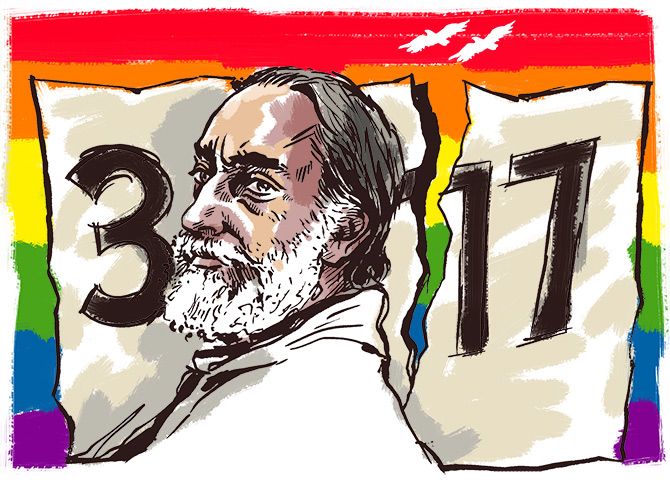'The reality is that 377 compromises the freedom and affects many of us adversely,' Navtej Singh Johar tells Manavi Kapur.
Illustration: Dominic Xavier/Rediff.com

What the British were thinking when they introduced Section 377 of the Indian Penal Code might never truly be known. They probably did not expect this law to outlast their rule in India by over 70 years.
The Victorian-era law, which was written in 1860 and which criminalises “unnatural” sexual acts, continues to stand strong despite several legal attempts to strike it down. There is hope that this might change.
Navtej Singh Johar, a Sangeet Natak Akademi Award-winning Bharata Natyam dancer and yoga teacher, has petitioned the Supreme Court with four other private citizens to decriminalise homosexuality and protect the rights of the LGBTQ community under Article 21 of the Indian Constitution, which pertains to the right of life.
His co-petitioners are journalist Sunil Mehra, restaurateur Ritu Dalmia, architectural restorer and hotelier Aman Nath, and marketing professional Ayesha Kapur.
The most striking departure from previous legal battles against Section 377 is that this petition is the first to be filed by private citizens who have come together only as members of the LGBTQ community and not as part of any specific organisation.
"I am making this petition because as a normal gay man, who considers himself to be a responsible and a worthwhile citizen of this country, 377 makes no sense. My orientation is different, that is all, and that is no crime," says Johar over e-mail.
Each of the petitioners wields significant social capital, and yet, as their petition states, they 'find their lives inexorably constricted and their rights infringed' by Section 377.
'Despite their formidable achievements and contribution to India, they are denied the right to sexuality, the most basic and inherent of fundamental rights. Section 377 of the IPC renders them criminals in their own country,' the petition reads.
Johar, who is in his mid-50s, is a popular face in Delhi's culture circuit and lives with his partner, Mehra, in Green Park.
The petition, a result of common interests coming together, was filed in April 2016. This was parallel to the February 2016 curative petition by Naz Foundation that was ordered by the Supreme Court to be heard in front of a Constitutional bench.
The legal team for the five private citizens is led by Menaka Guruswamy, Saurabh Kirpal, Arundhati Katju, Neeha Nagpal and Pritha Srikumar. Senior lawyers such as Kapil Sibal have appeared for the case.
A Supreme Court bench comprising Chief Justice Dipak Misra and Justices A M Khanwilkar and Dr D Y Chandrachud heard the case on January 8 this year.
An order was issued to debate the merits of this writ petition before a relevant bench. Johar's petition will now be heard on Tuesday, July 10.
More than the case itself, it was a matter of preserving the LGBTQ community's dignity.
"It was the 2013 Supreme Court judgment that said that homosexuals are a minuscule minority in India and that this law does not really affect anyone personally," says Johar.
"It was precisely this that made many of us want to step forward and put a face to this minority, which is not minuscule. And even if it is, the minority counts within a democracy. The reality is that 377 compromises the freedom and affects many of us adversely," he adds.
Parliamentarians and lawmakers have been vocal about overturning Section 377, but it will be a while before the archaic law is completely quashed.
"Shedding this moralistic, Western attitude towards alternative sexuality would be like flicking the last straw out of our psyches," says Johar.
"It would really mean decolonising our minds."









 © 2025
© 2025